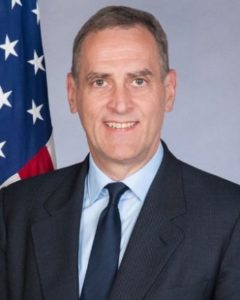Part Four –RPCV Ambassadors: Has the Peace Corps changed?
From the advantage point of their Foreign Service, and their role as Ambassadors, these RPCVs have noticed how the Peace Corps has changed over the years. At one time the Peace Corps was an organization that prided itself on sending Volunteers to parts of the world where no one else in the U.S. would go. No longer. The new rules circumscribe the ability of Volunteers to serve anywhere there is a hint of danger. Today’s Peace Corps, says these Ambassadors, is increasingly risk averse.
One Ambassador had a daughter serving in China. She was issued a cell phone so that she could call the office regularly, and risked termination if she didn’t. As he said, “This completely changes the nature of the Peace Corps Volunteer experience, and makes a Volunteer service less meaningful. It becomes like any other job. The slogan I used to think really encapsulated the PC experience, ‘The Toughest Job You’ll Ever Love,’ sadly no longer applies.”
Greg Engle, who was a PCV in South Koreas, ambassador in Togo, and then a country director in Ethiopia, has seen the Peace Corps as he puts it, “from quite a few angles.”
He has seen up close how the Internet has effected the Peace Corps experience. When he was the Country Director in Ethiopia, (2012-14) eighty percent had daily access to the Internet. “That was both a blessing and a curse,” he recalls. “It was a blessing in that they could communicate with family and friends in real time (many regular Skyped). It was a curse in that they could communicate with family and friends in real time (many regular Skyped). What that meant was that, to the extent that they were inclined, and many were, they could keep one foot in the US (or elsewhere), and in so doing, not have both feet in Ethiopia. My sense was that many of our PCVs in Ethiopia simply were not as integrated as we were when the communication cycle was 6+ weeks via blue tissue aerograms
Today, the Internet’s reach penetrates ever more deeply into the communities where PCVs serve, and PCVs are unavoidably going to be online. Although the Internet and cellphones do facilitate the staff’s work with the PCVs and enhance personal safety and security, the diminished community integration on the part of some has clearly had an impact on the PCV experience and how local communities perceive PCVs.
Greg says as a country director in Ethiopia he always tried to hold in check a “when I was a PCV” impulse, “but I must say that at the end of my time there I did feel kind of sad about this, on the Peace Corps Volunteers behalf.”
What hasn’t changed, all the Ambassadors agreed, is the incredible influence that Peace Corps Volunteers have made in underdeveloped nations. As one Ambassador put it, “In the country where I currently serve as Ambassador, almost all the leadership had Peace Corps teachers; for example, the Secretary of Foreign Affairs, attributes his high station in government to the Peace Corps Volunteer teachers he had when he was a student.”
Robert Riley (Gabon 1979-83) now our ambassador to Micronesia says this warm feelings toward PCVs is legendary. “In the FSM Peace Corps Volunteers have been intimately involved in FSM’s development over the past 52 years.”
These Ambassadors, like many RPCVs, continue their connections to their host countries. Tom Hull has stayed in touch with his students in Sierra Leone, including paying secondary school fees for many of them and even for some of their children. And after teaching all day while a volunteer, he also taught English to a little Muslim boy who lived next door to him but was not in his school. Decades later that “little boy” became Sierra Leone’s first Ambassador to the United Arab Emirates. “That’s what I consider my Peace Corps success story.”
While there have been changes in the Peace Corps experiences over the years, what hasn’t changed, according to these Ambassadors, is the quality of the PCVs.
“The PCVs I served with in Korea and the PCVs whose program I directed in Ethiopia were cut from the same cloth,” says Greg Engle. “They were idealistic, value-driven, service minded, and socially/culturally/environmentally conscious. Beyond that common thread, there were as many personalities as there were PCVs. All of them faced the challenge of connecting and making themselves useful in their communities; all of them struggled and felt discouraged at times; and the many with whom I’m still in contact are happy they stepped up to do “the hardest job you’ll ever love.”


John- You’re not chawing ’bout them “good ole days” again, are ya? When you pioneers were real men and women and since then, why we’re all pikers, right? Go stay in Torti, Panama near the Darien (like my son)- even with a cell phone.
I just asked the RPCV Ambassadors questions and reported their answers. I’m not “chawing ’bout them ‘good ole days.'” If you read their replies, you’d see they are saying that today’s PCVs are much like those from the first decades. Go read the piece again, Larry, and this time take a dictionary with you.